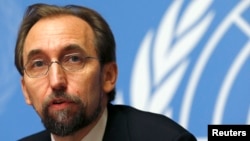The United Nations' top human rights official warned on Thursday that the fight against terror must not be used as an excuse to undermine democracy and human rights.
In a major speech to the 47-member U.N. Human Rights Council, Zeid Raad al Hussein said efforts by states to combat terrorism are resulting in large scale rights violations against the very citizens they claim to defend.
Zeid, the U.N. High Commissioner for Human Rights, said that an overreaction to extremist violence threatens to erode the system for global security, which states built 70 years ago to ward off the horror of war.
Zeid said counterterrorist operations that are disproportionate and brutal violate democratic norms and risk handing the terrorists a propaganda tool.
He cited a range of violations committed by terrorist groups, notably the Islamic State, known as IS or ISIL, and the Nigerian Boko Haram militants.
He called attention to acts of murder, torture and other extreme acts of cruelty committed against women and children, genocidal attacks on ethnic as well as religious groups, and the destruction of cultural heritage.
Zeid said any response to extremist violence must be targeted, proportionate and legal to be truly effective.
“Military campaigns, financial sanctions and attempts to stanch the inflow of weapons-such as the United Nations Arms Trade Treaty-may be part of the solution," he said. "But other actions are needed to stem the root causes that feed into these conflicts.
"We must acknowledge that large numbers of people do not join such extremist movements en masse because they have been suddenly and inexplicably hypnotized,” Zeid said.
Zeid said extremism is nurtured by ideology. He also said people who are alienated by years of state tyranny, repression, discrimination and deprivation are vulnerable to the lure of propaganda messages from extremist groups, such as IS, which promise them an alternative, as well as a better and more meaningful life.
“Many of the recruits that flock to ISIL from well over 50 countries are drawn, I believe, by messages of persecution and pity," Zeid said. "Filled with an ill-defined rage at what they perceive as unfair treatment in their own context, they may genuinely feel they are signing up to protect the abused.
"The fact that a vast majority of ISIL’s victims are fellow Muslims receives far less publicity," he said. "A real campaign of ideas to discredit ISIL will need to mobilize such facts.”
Zeid said deep-seated concerns about restrictions of freedom of expression and the shrinking of democratic space in several countries.
These include Armenia, Bangladesh, Burundi, the Democratic Republic of Congo, Egypt, Hungary, Russia and Venezuela.
He also expressed regret at the continued extensive use of the death penalty around the world and highlights serious cases of human rights abuses in countries such as the Central African Republic, North Korea, Mexico, Sudan and South Sudan.




